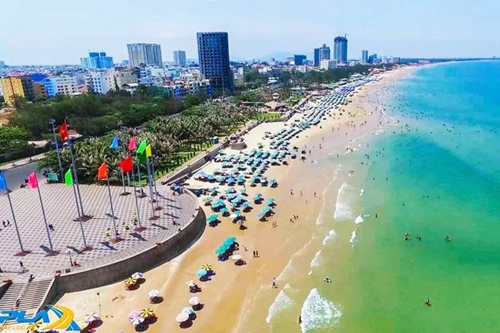The plan aims to convert Vung Tau city into an environmentally friendly city and centre for national tourism, finance and trade, with a developed maritime economy.
The adjustments were made to resolve the conflict between economic development and preservation of environmental resources.
The plan focuses on various areas, including urban planning, land funds, urban design, strategic environmental evaluations and response to climate change and rising sea levels.
A public transport system and urban underground system, as well as new urban lighting system, will also be built or upgraded.
In addition, the plan includes proposals on eco-farming and high-tech centres.
    |
 |
|
Vung Tau beach is an attractive tourism area in Ba Ria-Vung Tau province |
To meet its goals, the provincial government will establish investor-friendly reforms in many areas.
It plans to increase investments in distribution networks, technology transfer, skill development, and funding for small- and medium-sized enterprises.
The four key sectors in the province include seaport logistics, high-tech industrial production, tourism and high-tech agriculture.
Other areas of opportunities for investors include food processing, shipbuilding, traffic infrastructure and metallurgy-mechanical engineering.
Vung Tau city has a total area of 15,000 hectares. To attract more visitors, the authorities will offer new eco-tourism services, including visits to mangrove forests and aquaculture breeding areas.
The province have large areas of mangrove forest, which is the home of endemic wildlife such as black tigers and parrots and many fertile river mouths ideal for breeding marine species are now the key to a master plan for developing green community tourism integrated with cultural activities.
Under the plan, the province targets 8.6 million visitors by 2025, an annual average growth rate of 11 to 13 per cent, at least 16,000 high-standard hotel rooms, and 38,000 new jobs.
In the first half of this year, the province welcomed 6.5 million tourists and earned 2.8 trillion VND (around 123 million USD) from tourism activities, according to the provincial Department of Tourism.
Besides tourism, city authorities are also making efforts to develop high-tech agriculture that would produce high-quality products at high yields.
About 50 companies have submitted proposals to invest in high-tech agricultural projects on a total of 5,000ha.
The province has asked district authorities and other officials to help investors set up their projects.
Ba Ria-Vung Tau province, which has a 305km-long coastline, is one of the leading tourism hubs in Vietnam. With a cool and dry temperature all the year round, it is an ideal place for sea sports tourism and the development of deluxe seaside resorts.
Vung Tau city, lying on a peninsula of the same name, is the commercial and tourism centre of the province.
Source: VNA